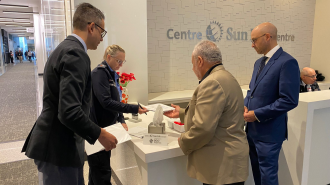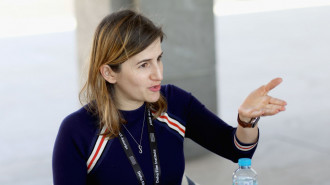
A world heritage site under threat: Palestinian Christians fight to reclaim UNESCO land seized by Israeli settlers

On July 31, Israeli settlers escorted by soldiers with the Israeli Civil Administration, the military body governing the occupied West Bank, raided the Kisiya family’s land in Al-Makhrour, a lush valley near Bethlehem, and forcibly evicted the Palestinian Christians.
Since then, the family, along with Palestinian, Israeli, and international activists, have continuously returned to their land to demonstrate against the eviction and reclaim their home.
“[The settlers] are trying now to use the war and [with] all eyes on Gaza and the demonstrations happening in Israel," Alice Kisiya, 30, told The New Arab.
"So they’re taking advantage of this situation to steal more lands,” she adds.
On the day of the eviction, the Israeli army declared an area adjacent to the Kisiya land a closed military zone.
While their land wasn’t included in the order, the army used it to bar the family from their land.
The Israeli military did not respond to The New Arab's inquiries.
UNESCO land under threat
Al-Makhrour was designated as a UNESCO World Heritage Site in 2014.
“It's because of the continuous inhabitation of humans for thousands of years,” Mazin Qumsiyeh, a Bethlehem University professor and director of the university’s Palestine Institute for Biodiversity and Sustainability, told The New Arab when explaining the UNESCO label.
Palestinians have long farmed Al-Makhrour’s ancient sloped terraces. Yet settlements are disrupting the area’s biodiversity, according to a 2023 report by Bethlehem University.
“This is UNESCO-recognised as under threat because of the expansion of settlements,” Qumsiyeh said.
Ongoing violence
State and settler violence has plagued the Kisiya family since 2005. Their family-owned restaurant was demolished in 2012, 2013, and 2015 because they built the structure without a permit.
The Kisiya land is located in Israeli-military-controlled Area C of the West Bank, where the Israeli army rarely grants Palestinians building permits.
For the Kisiyas, Israel repeatedly rejected the family’s permit applications, resulting in the army issuing a demolition order against their construction.
Ramzy Kisiya, the father, is a resident of the West Bank, while his wife and children, including Alice, are Israeli citizens.
In 2019, Israeli forces demolished their restaurant and home under the claim the Jewish National Fund (JNF), an NGO purchasing land for Jewish settlement, owns the area.
Despite the demolitions, the family remained on their land growing lemons, figs, grapes, apricots, and olives and sleeping in tents.
Initially, the Kisiyas faced demolition threats from the Israeli military. However, in 2017, the JNF joined the legal battle at Israel’s Supreme Court through its subsidiary, Himanuta, and alleged the organisation bought the land in 1969.
The Kisiyas deny this, saying they have lived on the land for generations and have never sold their property.
The Kisiya family used the land registration they received from the Civil Administration to prove their ownership in the Jerusalem District Court.
However, even with this document, the court sided with Himanuta and issued a restraining order against the family in May 2023.
With this decision, settlers seized the family’s land last month. Lior Tal, who erected the nearby Neve Ori settlement outpost, is reportedly behind the land theft along with Yaron Rosenthal, council leader of Gush Etzion, a bloc of settlements south of Jerusalem and Bethlehem.
Alice Kisiya told The New Arab that Himanuta claims Tal is renting the land from them. Himanuta and the Gush Etzion Council did not respond to The New Arab’s queries before publication.
A sequence of settlements
On June 27, 2024, Israel’s Security Cabinet legalised five settlement outposts in the West Bank, including Neve Ori.
Unlike traditional Israeli settlements, which are illegal under international law but legal under Israeli law, outposts are considered illegal by both the international community and the Israeli state.
Despite not being officially authorised, some outposts receive state support in construction, infrastructure, and defence.
The legalisation of outposts, to secure full funding and prevent demolition, is one of the top priorities for the current Israeli government.
Finance Minister Bezalel Smotrich, a settler himself, is pushing to expedite the approval of outposts across the West Bank through the newly created Settlement Administration. In April, he instructed other ministries to provide budgets and services to 68 outposts.
Yet legalising outposts is about more than just receiving full government benefits.
“The Makhrour area is particularly strategically important for a future Palestinian state,” Peace Now, an Israeli activist group which monitors settlement activity, wrote in a press release.
Al-Makhrour is at the centre of five Palestinian villages, where approximately 25,000 Palestinians reside. Legalising Neve Ori means severing these villages from Bethlehem and further fragmenting the land reserved for a Palestinian state.
“The intention of the new settlement is to create a sequence of settlements that will disconnect the Palestinian villages from Bethlehem while connecting the Gush Etzion settlements to Jerusalem,” Peace Now wrote.
Israeli newspaper, Israel HaYom, revealed maps and classified documents they obtained show Smotrich is initiating a plan in the Settlement Administration to obstruct Palestinian statehood.
“The five settlements approved for construction… by the Security Cabinet are the first step in a plan intended to prevent the Palestinians from having territorial continuity in Judea and Samaria [Israeli name for the West Bank],” Israel HaYom wrote.
Settlers may have taken over the family’s land, but Alice Kisiyah says the displacement is ultimately in the state’s hands.
While the JNF is a charity, it is highly influential in Israeli land policy and maintains quasi-governmental responsibilities.
“We are facing [the JNF] which means you are facing the Zionist state,” Alice Kisiya said.
“They’re closing everything around us — physically and even with money — to not let us breathe.”
Yet shouting into a megaphone next to a line of Israeli soldiers blocking her home, Alice Kisiya remains resilient.
Jessica Buxbaum is a Jerusalem-based journalist covering Palestine and Israel. Her work has been featured in Middle East Eye, The National, and Gulf News
Follow her on Twitter: @jess_buxbaum









 Follow the Middle East's top stories in English at The New Arab on Google News
Follow the Middle East's top stories in English at The New Arab on Google News


